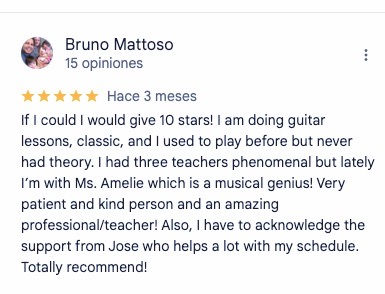Adult’s Guitar Lessons: Why It’s Never Too Late to Start Playing in Kingwood, TX
- Ines Scudellari
- Apr 10, 2025
- 4 min read
Updated: Aug 14, 2025

Have you always dreamed of playing guitar but feel like you “missed your chance”? You’re not alone — and you’re not too late!
At Kingwood Arts Academy of Music in Kingwood, TX, we welcome adult students of all ages and backgrounds. From absolute beginners to those revisiting a long-lost passion, learning guitar as an adult is not only possible but also incredibly rewarding.
In this comprehensive guide, we’ll cover everything you need to know about starting guitar lessons as an adult — from overcoming fears to practical scheduling tips and choosing the right guitar.
🎵 Why learn guitar as an adult?
Many adults assume that the guitar is something you have to start young. In reality, adults often progress even faster because they’re motivated, self-directed, and understand the value of consistent practice.
Benefits of adult guitar lessons include:
• Mental wellness and stress relief: Playing music lowers stress and boosts mood.
• Cognitive benefits: Learning an instrument improves memory, focus, and even
helps prevent cognitive decline.
• Creativity and self-expression: Guitar gives you a new way to express yourself.
• A sense of accomplishment: Setting and achieving personal goals builds confidence.
• Social connection: Whether you play at home or in groups, music brings people
together.
🎸 Overcoming fears and doubts: “Am I too old to start?”
No! Our adult students range from college students to retirees in their 70s and beyond. Music is truly for everyone.
“What if I don’t have any musical background?”
Many adults start from scratch — you don’t need prior experience. Our instructors break lessons down step by step, meeting you where you are.
“What if I don’t have time to practice?”
Even short daily sessions (10–15 minutes) can create progress. Adults often have more discipline than they realize!
👉 Read here: Are guitar lessons worth it for adults?
⏰ Flexible scheduling for busy adults
One of the biggest concerns for adults is fitting lessons into a hectic schedule. At Kingwood Arts Academy, we offer flexible options designed specifically for working professionals, parents, and retirees:
• Morning, afternoon, or evening slots to match your lifestyle.
• Weekend availability for those with full weekday schedules.
• Hybrid or online lessons as needed.
• Personalized lesson pacing — go as fast or as easy as you’d like.
👉 Read more: Can adults with a busy schedule take guitar lessons?
📅 How often should adults take lessons?
Most adults do well with one 30- to 60-minute lesson per week, plus regular home practice.
Consistency is key: it’s better to practice a little each day than to cram in long sessions sporadically. Your teacher will help you create a realistic, manageable practice plan.
👉 Read more: How often should adults take guitar lessons?
🪕 Teaching approach for adults
Adults often learn differently from children. We customize lessons to match your goals and
learning style.
We can focus on:
• Playing your favorite songs
• Understanding chord progressions and music theory
• Improvisation and soloing
• Fingerstyle, flatpicking, or rhythm techniques
• Reading sheet music or learning by ear
• Songwriting and composition
Your learning journey is entirely personalized. We move at your pace and prioritize what excites you most.
👉 Read more: How to teach guitar lessons to adults
🎸 Choosing your first guitar as an adult
One of the first decisions you’ll make is which guitar to start with.
Acoustic vs. electric
• Acoustic guitar: Great for singer-songwriters and those who want a portable,
unplugged option. Builds finger strength but can be harder to press at first.
• Electric guitar: Easier on the fingers, lighter string tension, and versatile for many
styles. You’ll need an amp, but it can feel less intimidating to press chords. Your teacher can help you choose and even try out different guitars in class before you make a purchase.
💡 Practice tips for adults
Create a dedicated practice space: Even a small corner makes it easier to get
started.
Set realistic goals: Start with one song or chord set rather than trying to learn
everything at once.
• Celebrate small wins: Recognize and enjoy each new chord, riff, or song.
• Record yourself: Listening back helps track progress and builds confidence.
• Join jam groups or open mics: Fun, social ways to stay motivated!
👥 Community and support
Learning guitar isn’t just about technique; it’s about connecting with others and enjoying the
journey.
At Kingwood Arts Academy, our adult students enjoy opportunities to perform at recitals, join adult ensembles, or simply share their progress with a supportive community. You’ll find peers who understand your challenges and share your excitement.
🏫 Why choose Kingwood Arts Academy for adult guitar lessons?
Here’s why our adult students love us:
✅ Flexible scheduling to match busy lifestyles
✅ Experienced instructors who specialize in adult learning
✅ Customized curriculum focused on your goals
✅ Welcoming, no-pressure environment
✅ Opportunities to perform and connect
🌟 Take the first step today!
Learning guitar is a gift to yourself — a way to spark joy, express creativity, and develop a skill that will stay with you for life. Whether you’re 25 or 75, there is no better time than now to start.
💬 FAQs
I have arthritis or hand pain — can I still learn to play the guitar? Yes! We can modify techniques, recommend suitable guitars (such as those with lighter strings), and adjust pacing.
Do I need to read sheet music? No, many adults learn by chord charts, tabs, or ear. We teach you the approach that best suits your goals.
Is it possible to play in a band eventually? Definitely! Many adult students join local jam sessions or bands after a year or two of lessons.
Check what our students are saying:




Ready to start? Click HERE to request information.




Comments